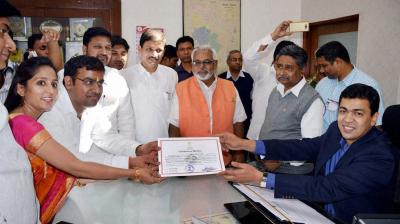In a significant setback to Ajit Pawar, four prominent leaders have resigned from the Nationalist Congress Party (NCP) following the disappointing outcomes in the recent Lok Sabha elections. Speculations are rife that these departures may signal a potential shift towards Sharad Pawar’s faction.
The NCP, reeling from electoral setbacks across several constituencies, faced internal turmoil as senior leaders opted to part ways. Among those who tendered their resignations are individuals with longstanding affiliations to the party, citing strategic differences and the need for realignment within Maharashtra’s political landscape.
Ajit Pawar, known for his influence in the party’s decision-making processes, now confronts a critical juncture as the departures underscore challenges to his leadership style and electoral strategies. The resignations, viewed as a “Ghar Wapsi” to Sharad Pawar’s camp by political analysts, could potentially reshape the power dynamics within the NCP.
Political observers note that these developments come amidst growing discontent over the party’s electoral strategies and leadership decisions during the recent Lok Sabha polls. The loss of key leaders, each possessing considerable grassroots support, poses a formidable challenge to Ajit Pawar’s efforts to consolidate party unity and revitalize its electoral prospects ahead of future state elections.
While Ajit Pawar remains a central figure within the NCP, the departure of these leaders highlights internal fissures and the complexities of managing divergent political ambitions within the party. The ensuing weeks are likely to witness intensified efforts from both factions to shore up support and recalibrate their respective political agendas.
In response to the resignations, Ajit Pawar expressed regret over the departures but reaffirmed his commitment to steering the NCP through this challenging phase. He emphasized the party’s resilience and reiterated his resolve to address concerns raised by the departing leaders, signaling a cautious approach to managing internal dissent and preserving party cohesion.
As Maharashtra’s political landscape continues to evolve, the repercussions of these resignations are expected to reverberate across regional politics, influencing coalition dynamics and electoral strategies in the foreseeable future. The realignment within the NCP underscores broader implications for the state’s political equations, setting the stage for potential recalibrations and alliances ahead of upcoming state elections.
Amidst these developments, the focus remains on how Ajit Pawar and Sharad Pawar navigate the aftermath of these departures, with all eyes on the unfolding strategies and maneuvers that will shape the NCP’s trajectory in the coming months.




 NITI Aayog Reconstituted: New Panel Includes 15 Ministers and NDA Allies
NITI Aayog Reconstituted: New Panel Includes 15 Ministers and NDA Allies 